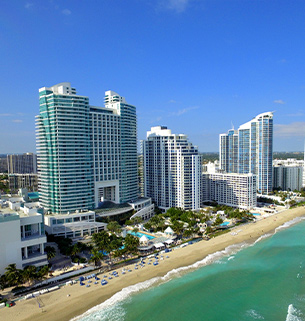Sponsored Content - US tax laws make a compelling case for the island commonwealth, says Adrian Beales, director of sales for Lifeafar Capital, as he provides an in-depth look at Puerto Rico’s investor-friendly tax decrees, credits, and exemptions.
Officially named the Commonwealth of Puerto Rico (or Estado Libre Asociado de Puerto Rico), Puerto Rico is a self-governing, unincorporated territory of the United States. Located in the northeastern Caribbean, the island is a quick two-hour flight from the US. Long considered a tax haven, Puerto Rico draws mainland entrepreneurs seeking freedom from federal income taxes.
To promote and develop key industries, Puerto Rico has rolled out an impressive number of economic incentives that make living and investing there more compelling than ever before.
In this article, we’ll review just a few of the most appealing and important tax incentives for entrepreneurs and investors in Puerto Rico.
Act 60 (formerly Act 20 & 22)
Puerto Rico introduced the Export Services Act (Act 20) and the Individual Investors Act (Act 22) in 2012. The purpose of these two acts was to draw foreign investors to Puerto Rico with tax incentives for starting businesses on the island. In July 2019, Acts 20 and 22 were consolidated, updated, and retitled as Act 60. The legislation, which came into effect in January 2020, provides some of the island’s most attractive tax rates for entrepreneurs.
This is a brief overview of the benefits included in Act 60:
- A 4% corporate tax rate – Under Act 60, the maximum corporate tax rate for Puerto Rico corporations that export services from the island nation is 4%. The low corporate tax rate is ideal for online businesses that have mainland clients and staff. To qualify, business owners must start a business in Puerto Rico and provide services to the US. In addition, companies with businesses based on the US mainland that move to Puerto Rico are exempt from paying US exit taxes. Entrepreneurs from any industry can qualify for the 4% corporate tax rate as long as their service is performed on the island and exported.
- Zero tax on capital gains, interest, dividends, and royalties – Act 60 exempts qualifying residents of Puerto Rico from paying taxes on capital gains, interest, dividends, and royalties. This includes capital gains from stocks, bonds, and even cryptocurrency.
- Zero tax on distributions from earnings and profits – Under Act 60, distributions from earnings and profits derived from the export services income of qualifying businesses are 100% exempt from US federal income taxes.
- 75% exemption on property taxes – Act 60 gives qualifying businesses a 75% exemption on real and personal property taxes.
- 50% exemption on municipal taxes – All of Puerto Rico’s 78 municipalities are permitted to levy a tax on the gross receipts of any entity engaged in business within their defined area. For tourism and property-related businesses, this tax is 0.5%. (financial institutions are subject to a 1.5% tax.) Under Act 60, eligible businesses qualify for a 50% exemption from municipal license taxes, municipal excise taxes, and other municipal taxes levied by municipalities.
How to qualify: In order to be eligible for Act 60, investors must become “bonafide” residents of Puerto Rico. To become a bonafide resident of Puerto Rico, you must meet the following qualifications:
- You are a US citizen
- You were present in Puerto Rico for at least 183 days during the tax year
- You do not have a tax home outside of Puerto Rico
- You do not have a closer connection to the US or another country than Puerto Rico. Typically, you can demonstrate that you don’t have a closer connection to any other place by providing evidence that you have moved your life to Puerto Rico.
In addition, to be eligible for the zero taxes on capital gains, interest, dividends, and royalties, individuals need to purchase a primary residence in Puerto Rico and make an annual charitable donation of $10,000 USD or more.
Economic Incentives for the Development of Puerto Rico Act (Act 73)
Enacted in 2008, the Economic Incentives for the Development of Puerto Rico Act is designed to promote the development of local industries and draw foreign investment of companies, particularly those dedicated to technology advancement. Benefits include:
- 4% or 8% fixed-income tax rate
- 2% or 12% withholding tax on royalty payments
- Innovative activities are subject to an income tax rate of 0-1% in instances where the intangible property was created or developed in Puerto Rico.
- A minimum combined tax rate of 3% if at least half of the exempt business shareholders are residents of Puerto Rico.
- A minimum combined tax rate of 1% for small or medium-sized businesses. Small or medium-sized companies are those that averaged a gross income of $10 million USD or less over the last three years.
- A 25% tax credit on purchases of products that are manufactured in Puerto Rico
- A 35% tax credit on purchases of products made in Puerto Rico that are made from recycled materials
- A tax credit for job creation during the first year of operation. The credit ranges from $1,000 USD per job created in an industrial area of intermediate development to $2,500 USD for jobs created in an industrial area of low development. If the company is located in the municipalities of Vieques or Culebra, the tax credit is $5,000 USD per job.
Tourism Development of Puerto Rico (Formerly Act 74)
Introduced in 2010, the Tourism Development Act is a series of tax credits and incentives for both new and existing tourism businesses that qualify. Qualifying businesses include hotels, condo-hotels, timeshares/vacation clubs, hostels, guesthouses, bed & breakfasts, theme parks, golf courses, and other entertainment or recreational tourism-related businesses.
Act 60 eliminated what was a 90% exemption on tourism development income (TDI), replacing it with a 4% flat tax on all income derived from tourism activity. This simplified tax supersedes all other tax liabilities for eligible businesses with a tax exemption decree.
While in practice, this represents a relatively small change in overall tax liabilities for most businesses, it streamlines the tax code, provides a greater degree of transparency, harmonizes various previously disparate elements of the tax law, and offers investors certain benefits that were previously unavailable.
Under the previous tax code, TDI in Puerto Rico (minus the 90% exemption) was subject to the applicable corporate tax rate of 18.5%, plus a graduated surcharge of up to 19% on net income above $275,000 USD, which resulted in an effective maximum corporate tax rate of 37.5%. Dividends paid out to shareholders were also subject to an additional tax—typically 15%, which is zeroed out under the new tax code.
The current tax structure represents a major simplification and reduction in the overall tax burden for investors in eligible tourism-related businesses.
Exemption From Puerto Rico’s Sales and Use Tax
Businesses operating in Puerto Rico providing taxable goods or services are required to collect a 10.5% sales and use tax (SUT). In addition, all of Puerto Rico’s 78 municipalities are entitled to collect an additional 1% SUT.
The combined 11.5% SUT applies to the following items:
- Tangible personal property
- Taxable services
- Admission rights
Eligible businesses with a tax decree qualify for up to a 100% exemption on SUT with respect to items acquired and used by the business in relation to the Tourist Activity.
This tax exemption provides major benefits for investors interested in developing commercial or rental properties in Puerto Rico by zeroing out the SUT liability on certain goods and services.
Tourism Investment Tax Credits
Under the Incentive Code, investors in eligible tourism and development-related businesses qualify for a significant tax credit. This credit is fully transferable; meaning investors can sell their tax credit to another party or third-party broker which can provide additional capital to reinvest in their business. Income from the transfer or sale of a tax credit is entirely tax-exempt.
Two different tax credits are available:
- 40% alternative credit – The maximum amount of this tax credit is 40% of the total project cost, plus the first year’s operational expenses. It may be taken in three equal installments beginning on the business’s second year of operations. Subsequent installments are payable in the third and fourth years of operation.
- 30% alternative credit – The maximum amount of this tax credit is 30% of the total project cost. The first credit—up to 10% of the total project cost—is available the year the business secures financing for the tourism project. Three additional credits accounting for the balance are payable the year the business receives its first paying guest and the remaining two are paid during the subsequent years.
Besides increasing returns to investors for qualified development projects, tax returns also offer the opportunity to refinance projects after three years of operation which can lead to investors receiving back some or all of their original capital many years before a particular project is sold.
Puerto Rico’s current investor-friendly tax regime and permissive regulatory environment compare advantageously to other investment opportunities in the United States.
For investors seeking to minimize their tax burden, Puerto Rico offers a comprehensive set of tax incentives that are hard to beat. To learn more, click here.













